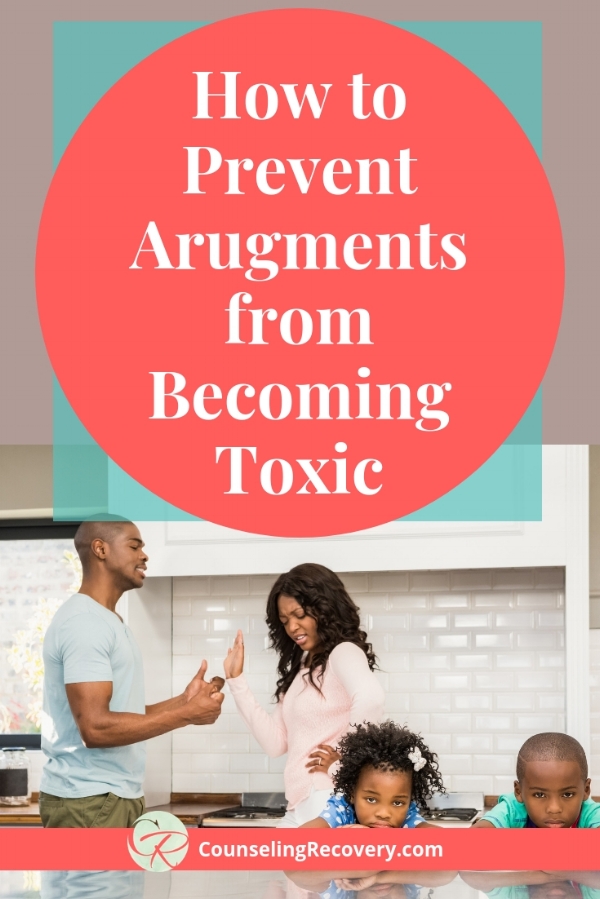How to Prevent Arguments from Becoming Toxic
Every couple argues but when conflicts become toxic, the relationship begins to feel unsafe. These conversations aren’t just a typical fight. They’re filled with hurtful, below the belt jabs that don’t get repaired. Eventually, no one feels secure and the relationship becomes in jeopardy.
This article shows how to prevent arguments from destroying the connection you’ve worked so hard to create.
Elements of a Toxic Argument
There are three habits that create a toxic argument. You need to identify them to know what to fix. Doing this takes courage because it’s not easy admitting fault. I’ll show you the three elements and include a corresponding tip for what to do instead.
Criticism - defined by negative, critical comments that escalate an argument almost instantly.
Blame - happens when targeting other people’s flaws which helps to avoid accountability.
Contempt - the intention is to make the other person feel crazy or less than.
How Toxic Arguments Start
It usually starts with a simple, “innocent” comment that comes off as criticism. It can be confusing when a conversation starts to go downhill. This happens because the listener feels criticized in some way.
It could be something said directly or implied. A major culprit here is tone of voice and what’s not being said. Once the listener starts assuming, it goes downhill fast.
It sounds something like this.
You come home from work feeling tired and hungry. Your spouse has forgotten to take out the garbage again. With a raised voice you say:
“Why is the garbage is still out? Now the garbage is going to stink all week! “
You roll your eyes and say something nasty under your breathe. But the message is clear.
According to The Gottman Institute, how a conversation starts predicts the outcome. But the reverse is also true. When you start a conversation off right, your partner feels more receptive and your message gets heard.
Tip: If you have a concern, instead of focusing on what they’re doing wrong - ask for what you want in a positive way.
“I’d really appreciate if you could remember to dump the garbage. I know you’re busy but it would really help me out.”
That second sentence will make your partner feel understood - even when the task isn’t done yet!
How to Correct a Bad Start
The most common mistake couples make in their communication is deceptively simple – they focus more on expressing “You” statements instead of “I” statements. This creates a negative cycle of attack and defend that’s hard to stop. It’s called the blame game. It sounds like this:
Sandy says to her husband Mike,
“You never listen to me. I told you that I was working late but you never listen. You’re so inconsiderate, you only think of think yourself.”
I count four “you” messages in that! Her communication focuses on his bad behavior.
A “you” statement creates defensiveness. It’s natural to want to defend yourself but it doesn’t lead to anything productive.
Tip: Shift your focus to what you need. Let’s see what this looks like with Sandy and Mike.
“I feel really frustrated when you don’t remember what I’ve said. I need you let me know if it’s not a good time to talk.”
In the second example, Sandy is more focused on communicating what she needs verse blaming Mike for not listening.
Here is the formula: I feel (name your feeling) when you (name the behavior specifically without judgment). I’d appreciate if you (name what you want instead).
The Cost of Contempt
The Gottman Institute spent years researching what predicts divorce and by far the most common predictor is contempt. These behaviors cause irreparable damage when done repeatedly. Important signs of contempt include:
Verbal put downs and insults
Comments that make your partner feel crazy or deny their reality (gaslighting)
Nonverbal cues such as rolling your eyes, or seething in silence
Sarcasm and aggressive humor
Showing distain or treating someone disrespectfully
Making fun or mocking someone
Implying that the other person is stupid or inferior
When contempt becomes a pattern, it destroys any sense of confidence and emotional security in a relationship. Instead, the goal is to manage more difficult feelings like anger and resentment. Contempt provides an outlet for expressing frustrations. It’s okay to get angry but avoid making the other person bad or wrong.
Tip: Don’t bottle up your feelings until they’re too big to handle. Acknowledge how you feel without attacking the other person. Contempt only serves to make your partner avoid you.
When Anger Takes Over
When anger gets abusive, contempt becomes an everyday habit. Hurting someone else becomes the way to feel better but it comes at a cost. Others are afraid of you and intimacy stops. Here are some ways to handle anger more effectively.
Identify early warning signs of anger to avoid raging.
Communicate the need for time-outs before you need to use them.
Rate your stress level from 1-10 throughout the day to catch it early.
Avoid profanity because it tends to escalate anger.
Being accountable for your behavior help to repair the hurt.
Final Thoughts
Toxic arguments happen when there is blame and contempt. This destroys any chance of sustaining a healthy connection. By having the course got confront these patterns, you can transform your communication. Resolution only takes a willingness to get started and look at yourself. You can start today!

